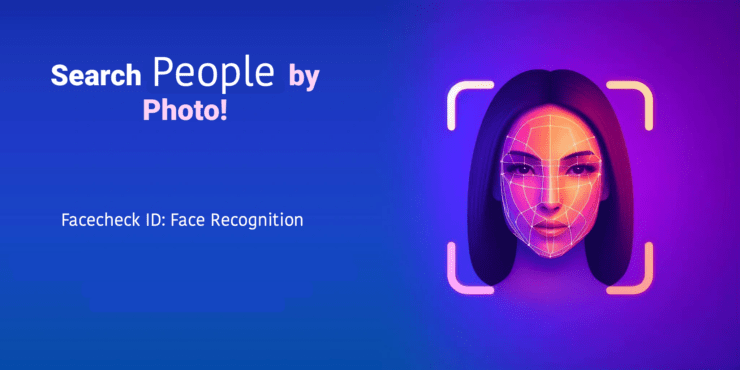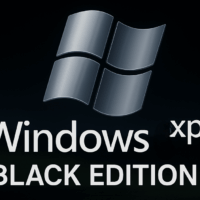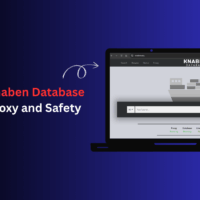FaceCheck is an innovative facial search tool that enables users to conduct online searches using facial photographs. It provides search results containing links to web pages where the submitted face image or similar faces have been detected.
FaceCheck leverages advanced artificial intelligence technology to identify faces, assess facial similarities, and conduct rapid searches through extensive datasets.
Let’s look at some of the features, usage, safety, price, and legality of FacecheckID.
What is Facecheck ID?
FaceCheck ID is a tool that verifies a person’s identity by using AI and facial recognition technology. You can reverse face search to find the profile or more details about a person by a photo. The tool scans available sources to find matches for the face photo uploaded.
It’s useful for industries like finance, security, and online services that require high-level identity verification. FaceCheck ID is user-friendly and can be easily integrated into existing systems and processes. It saves time and money for businesses of all sizes by streamlining their identity verification processes. It also enhances security measures while providing a seamless experience for customers.
Features of Facecheck.ID
Below are some common features of Facecheck ID.
1. Identity Verification
Facecheck ID enables quick and accurate identity verification. Users can confirm their identity by presenting their faces to a camera or uploading a photo.
The system then compares the facial characteristics with registered profiles to authenticate the individual.
2. Facial Recognition
The core feature of Facecheck ID is its ability to perform facial recognition. This involves analyzing unique facial features such as the distance between eyes, nose shape, and jawline to create a facial signature or template.
When a person’s face is scanned, the system compares it against a database of stored facial templates to verify identity.
3. Access Control
One of the primary applications of Facecheck ID is access control. Businesses can use this technology to regulate entry into secure areas by scanning employees’ or authorized individuals’ faces. This eliminates the need for physical access cards or passwords.
4. Fraud Prevention
Facecheck ID helps prevent identity fraud in various sectors. For instance, financial institutions use this technology to verify customers during transactions, reducing the risk of unauthorized access and fraudulent activities.
5. Scalability
Facecheck ID is designed to be scalable, accommodating varying workloads and user bases. Whether used for small businesses or large enterprises, the technology can handle numerous identity verifications efficiently.
6. Attendance Tracking
Educational institutions and workplaces leverage Facecheck ID for automated attendance tracking.
By scanning faces upon entry, the system can record attendance without manual input, streamlining administrative processes.
7. User Experience
Facecheck ID aims to enhance user experience by offering seamless and convenient identity verification.
You can authenticate yourself simply by presenting your face, eliminating the need for complex passwords or physical documents.
8. Data Security
Facial recognition systems like Facecheck ID prioritize data security. They employ encryption, access controls, and other measures to protect facial data from unauthorized access or breaches, ensuring compliance with data protection regulations.
9. Integration
Facecheck ID can be integrated with various software systems and hardware devices. This allows seamless implementation into existing environments, such as mobile apps, kiosks, or surveillance cameras, expanding its usability and applicability.
10. Customization
Providers of Facecheck ID often offer customization options to tailor the technology to specific use cases and business needs.
This includes integrating the technology into existing applications or workflows and adapting it to unique security requirements.
How is Facecheck ID Used?
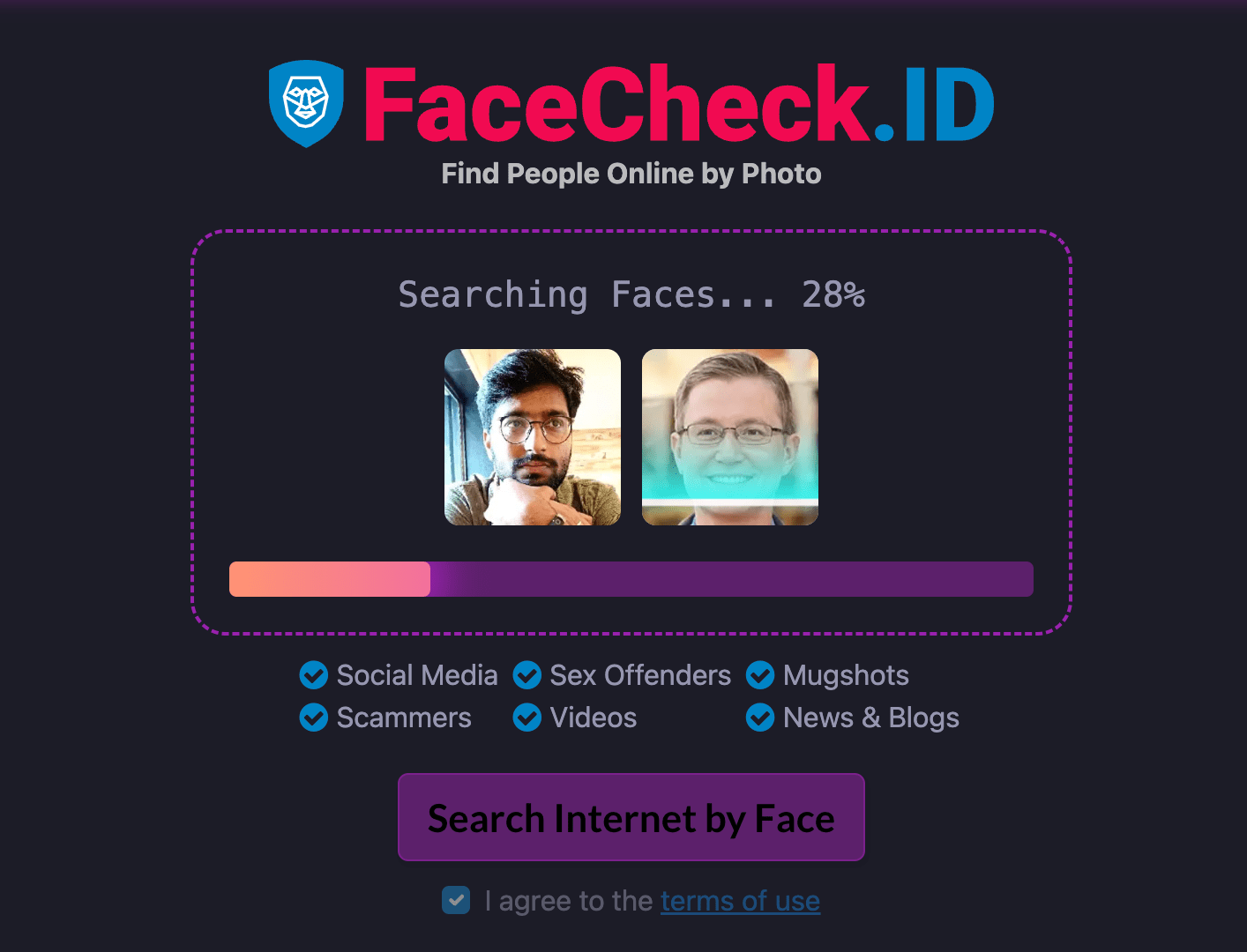
Facecheck ID is used in:
- Identity Verification: Facecheck ID is commonly used for identity verification purposes in various industries. For example, it can be integrated into banking apps to allow customers to securely access their accounts without passwords.
- Access Control: Some businesses use Facecheck ID for physical access control to restricted areas. Employees or authorized individuals can gain entry by having their faces scanned.
- Attendance Tracking: Educational institutions and workplaces use Facecheck ID for automated attendance tracking. This can streamline processes and reduce manual work.
- Customer Authentication: E-commerce platforms can use Facecheck ID to verify customers during transactions, reducing the risk of fraud.
Safety and Privacy Concerns
While facial recognition technology offers convenience and efficiency, it also raises significant safety and privacy concerns. These include:
Data Security: The storage and handling of facial data raise concerns about data breaches and unauthorized access.
Biases and Accuracy: Facial recognition algorithms may exhibit biases and inaccuracies, particularly with certain demographic groups, leading to potential discrimination.
Surveillance: Widespread use of facial recognition could lead to increased surveillance and erosion of privacy rights.
Consent and Transparency: Users should be informed about how their facial data will be used and have the option to opt out.
Facecheck ID Pricing
Facecheck ID offers both free and premium services. The free version allows limited searches per day, while the premium version provides additional search capabilities and features.
Prices for the premium services vary, starting from $10 per month or $90 per year. Credit packages for searches can also be purchased with cryptocurrency, with prices ranging from $6 for 36 credits to $597 for 10,000 credits.
Is Facecheck ID Legal?
The legality of using Facecheck ID depends on compliance with applicable laws and regulations. Businesses and individuals should ensure they adhere to the following guidelines:
- Consent: Obtain explicit consent from individuals before capturing and processing their facial data.
- Data Protection: Implement robust security measures to protect facial data from unauthorized access or breaches.
- Transparency: Communicate the purpose and scope of facial recognition usage to users.
- Compliance: Stay updated with evolving regulations and adjust practices accordingly.
How to Remove Your Photos from the FaceCheck Search Engine
Deleting your photos from the FaceCheck search engine is a straightforward and quick process, and it’s always free of charge. This method offers an instant and traceable solution, unlike the traditional and slow DMCA takedown process.
To begin, use your photograph to locate your face within the search results. Next, navigate to the top menu and click on the “[Remove My Photos]” link. Choose all the photos you wish to delete and have removed from the search index.
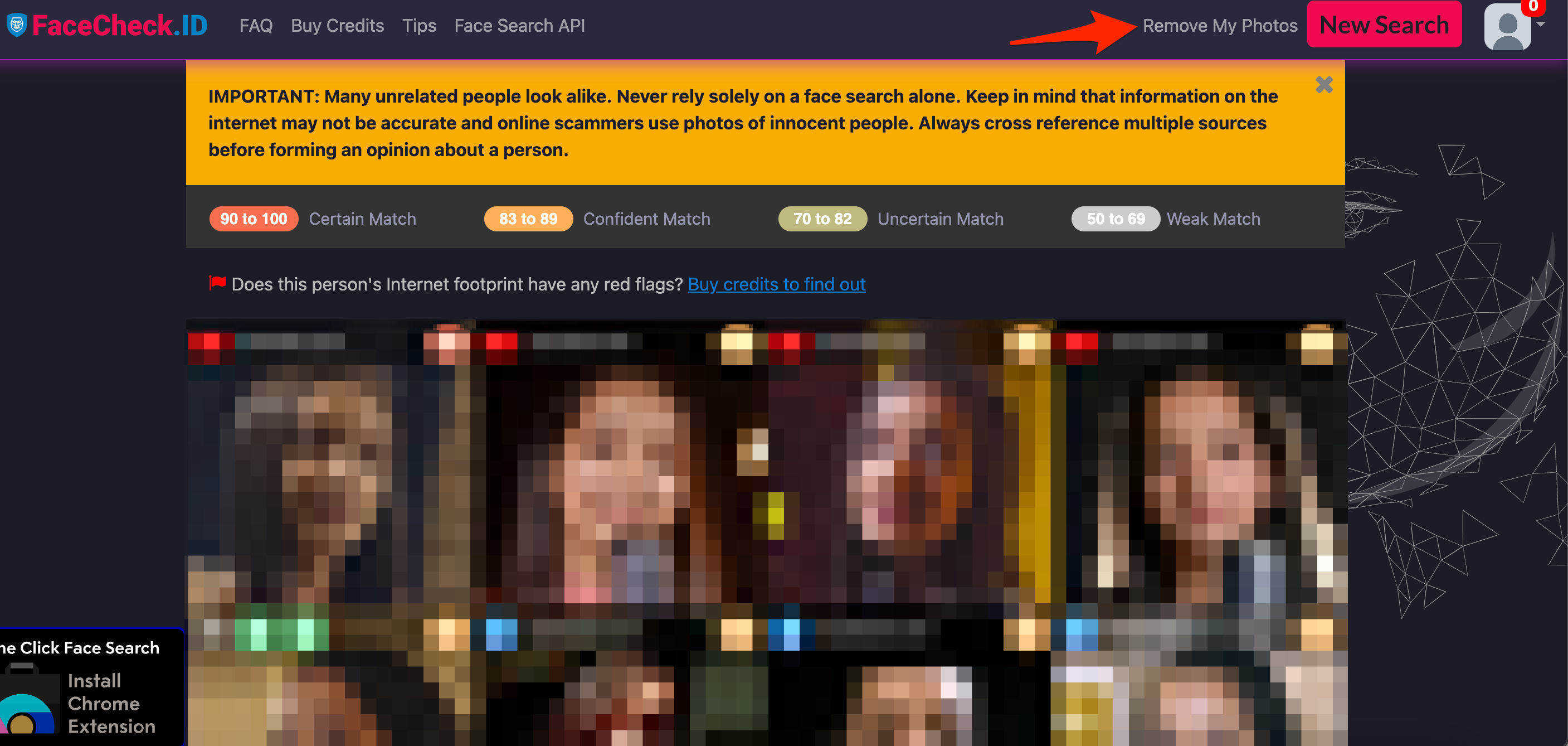
After selecting your photos, proceed to the bottom of the page. Here, you’ll need to upload a citizen card, driver’s license, or passport that has been anonymized to hide sensitive details like your name, address, and ID number.
If you cannot provide an ID document, you have the option to upload a selfie clearly showing your face with two fingers touching your chin. Once the form is submitted, you’ll receive a tracking link. Your photos will immediately be concealed and will not appear in new searches.
Within 1 to 5 business days, their administrators will review the uploaded document for legitimacy and facial match verification. Upon approval, your photos will be permanently deleted, and the deletion request will be fulfilled.
Rest assured that your uploaded document will also be deleted from their records for security purposes.
Frequently Asked Questions
Is There a Charge for Deleting My Photos?
No, FaceCheck does not charge anything for deleting your photos. They operate ethically and uphold high standards of integrity.
What Legal and Ethical Principles Does FaceCheck Follow?
FaceCheck operates within legal parameters, indexing publicly available photos similar to Google, Bing, and other search engines. They respect legitimate requests to remove copyrighted content and comply with legal regulations and ethical standards that safeguard individual privacy rights. If facial recognition technology is prohibited in your jurisdiction, please discontinue using this website immediately.
Does FaceCheck Collect, Store, Display, or Sell Personal Information Such as Names, Addresses, or Phone Numbers?
No, FaceCheck ID does not collect, store, display, or sell any personally identifiable information. Their system retains only low-resolution thumbnails and URL links to publicly available third-party websites.
Can FaceCheck Help Locate Lost Relatives?
FaceCheck can aid in the search for relatives by identifying similar facial features. However, resemblance alone does not confirm a familial relationship. It serves as a helpful starting point but should be combined with other methods for accurate results.
Does Facecheck ID’s AI Search for Individuals Under 18?
No, their AI is specifically trained to recognize adult faces and cannot reliably identify children. Searching for images of minors violates their terms of use and will result in a ban.
In a Nutshell
Facecheck ID represents a significant advancement in digital identity verification, offering convenience and enhanced security.
However, its use comes with responsibilities regarding safety, privacy, and legal compliance. As the technology continues to evolve, so too must the frameworks that govern its use, ensuring that Facecheck ID remains a tool for positive change and not a source of contention.
If you've any thoughts on Facecheck ID: Complete Guide, Usage, Safety, Price and Legality, then feel free to drop in below comment box. Also, please subscribe to our DigitBin YouTube channel for videos tutorials. Cheers!
